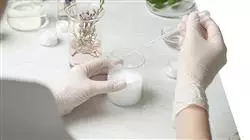University certificate
The world's largest faculty of medicine”
Introduction to the Program
Carrying out a correct diagnosis is essential in the solution of dermatological problems, so with this certificate you will identify the main tools and methods updated in the cosmetic field"

Over the last few years, the techniques and methods for a correct diagnosis have been changing, so the medical professional has to know the latest updates in terms of analyzing samples, collating information and taking tests. This is why it is necessary to delve deeper into diagnostics, since in the future they will provide more answers to possible medical solutions.
In addition to this, the professional will be able to identify new tools that will allow them to provide solutions to the patient's needs, starting from a first assessment and knowing the future pathologies that may develop. To this extent, diagnosis becomes important, since it is the starting point for the correct development and treatment of the disease.
However, when it comes to skin conditions, a correct diagnosis can lead to a treatment based on cosmetics or with a strong support on them. This is why it is necessary for specialists from various branches to update their knowledge in this specialty, since advances in cosmetic guidelines for nails and hair represent a differential component when it comes to prescribing a cosmetic treatment.
Thus, this TECH Postgraduate certificate has arisen, which provides medical professionals with the latest knowledge on skin permeability of cosmetics, acne, stretch marks and other conditions of special interest. The program takes in a comfortable and accessible 100% online format. In addition, the physician will be supported by a specialized teaching staff in the area, who will be available whenever needed, in order to resolve doubts and to resolve doubts and concerns as the program develops. It is, therefore, a unique opportunity to work on perfecting your professional skills through an austere, dynamic, multidisciplinary degree program adapted to your academic needs.
You will update your knowledge alongside knowledgeable experts in the field with more than 10 years of experience in the cosmetic sector"
This Postgraduate certificate in Skin Diagnosis applied to Cosmetics contains the most complete and up-to-date scientific program on the market. The most important features include:
- Practical cases presented by experts in Cosmetic Science and Technology
- The graphic, schematic, and practical contents with which they are created, provide scientific and practical information on the disciplines that are essential for professional practice
- Practical exercises where the self-assessment process can be carried out to improve learning
- Emphasis on innovative methodologies
- Theoretical lessons, questions to the expert, debate forums on controversial topics, and individual reflection assignments
- Content that is accessible from any fixed or portable device with an Internet connection
This Postgraduate certificate will provide you with the necessary tools for a correct skin diagnosis, applying the best cosmetic products to solve the problem"
The program includes, in its teaching staff, professionals from the sector who bring to this program the experience of their work, in addition to recognized specialists from prestigious reference societies and universities.
The multimedia content, developed with the latest educational technology, will provide the professional with situated and contextual learning, i.e., a simulated environment that will provide immersive education programmed to learn in real situations.
This program is designed around Problem-Based Learning, whereby the professional must try to solve the different professional practice situations that arise during the academic year. For this purpose, the student will be assisted by an innovative interactive video system created by renowned and experienced experts.
A 100% online program, which will allow you to manage your time and exercise the development of the Postgraduate certificate following the schedule that best suits you"

This Postgraduate certificate is the best option for you, since you will find unpublished information about skin diagnostic processes"
Why study at TECH?
TECH is the world’s largest online university. With an impressive catalog of more than 14,000 university programs available in 11 languages, it is positioned as a leader in employability, with a 99% job placement rate. In addition, it relies on an enormous faculty of more than 6,000 professors of the highest international renown.

Study at the world's largest online university and guarantee your professional success. The future starts at TECH”
The world’s best online university according to FORBES
The prestigious Forbes magazine, specialized in business and finance, has highlighted TECH as “the world's best online university” This is what they have recently stated in an article in their digital edition in which they echo the success story of this institution, “thanks to the academic offer it provides, the selection of its teaching staff, and an innovative learning method aimed at educating the professionals of the future”
A revolutionary study method, a cutting-edge faculty and a practical focus: the key to TECH's success.
The most complete study plans on the university scene
TECH offers the most complete study plans on the university scene, with syllabuses that cover fundamental concepts and, at the same time, the main scientific advances in their specific scientific areas. In addition, these programs are continuously being updated to guarantee students the academic vanguard and the most in-demand professional skills. In this way, the university's qualifications provide its graduates with a significant advantage to propel their careers to success.
TECH offers the most comprehensive and intensive study plans on the current university scene.
A world-class teaching staff
TECH's teaching staff is made up of more than 6,000 professors with the highest international recognition. Professors, researchers and top executives of multinational companies, including Isaiah Covington, performance coach of the Boston Celtics; Magda Romanska, principal investigator at Harvard MetaLAB; Ignacio Wistumba, chairman of the department of translational molecular pathology at MD Anderson Cancer Center; and D.W. Pine, creative director of TIME magazine, among others.
Internationally renowned experts, specialized in different branches of Health, Technology, Communication and Business, form part of the TECH faculty.
A unique learning method
TECH is the first university to use Relearning in all its programs. It is the best online learning methodology, accredited with international teaching quality certifications, provided by prestigious educational agencies. In addition, this disruptive educational model is complemented with the “Case Method”, thereby setting up a unique online teaching strategy. Innovative teaching resources are also implemented, including detailed videos, infographics and interactive summaries.
TECH combines Relearning and the Case Method in all its university programs to guarantee excellent theoretical and practical learning, studying whenever and wherever you want.
The world's largest online university
TECH is the world’s largest online university. We are the largest educational institution, with the best and widest online educational catalog, one hundred percent online and covering the vast majority of areas of knowledge. We offer a large selection of our own degrees and accredited online undergraduate and postgraduate degrees. In total, more than 14,000 university degrees, in eleven different languages, make us the largest educational largest in the world.
TECH has the world's most extensive catalog of academic and official programs, available in more than 11 languages.
Google Premier Partner
The American technology giant has awarded TECH the Google Google Premier Partner badge. This award, which is only available to 3% of the world's companies, highlights the efficient, flexible and tailored experience that this university provides to students. The recognition as a Google Premier Partner not only accredits the maximum rigor, performance and investment in TECH's digital infrastructures, but also places this university as one of the world's leading technology companies.
Google has positioned TECH in the top 3% of the world's most important technology companies by awarding it its Google Premier Partner badge.
The official online university of the NBA
TECH is the official online university of the NBA. Thanks to our agreement with the biggest league in basketball, we offer our students exclusive university programs, as well as a wide variety of educational resources focused on the business of the league and other areas of the sports industry. Each program is made up of a uniquely designed syllabus and features exceptional guest hosts: professionals with a distinguished sports background who will offer their expertise on the most relevant topics.
TECH has been selected by the NBA, the world's top basketball league, as its official online university.
The top-rated university by its students
Students have positioned TECH as the world's top-rated university on the main review websites, with a highest rating of 4.9 out of 5, obtained from more than 1,000 reviews. These results consolidate TECH as the benchmark university institution at an international level, reflecting the excellence and positive impact of its educational model.” reflecting the excellence and positive impact of its educational model.”
TECH is the world’s top-rated university by its students.
Leaders in employability
TECH has managed to become the leading university in employability. 99% of its students obtain jobs in the academic field they have studied, within one year of completing any of the university's programs. A similar number achieve immediate career enhancement. All this thanks to a study methodology that bases its effectiveness on the acquisition of practical skills, which are absolutely necessary for professional development.
99% of TECH graduates find a job within a year of completing their studies.
Postgraduate Certificate in Skin Diagnosis applied to Cosmetics
The skin is the largest organ of the human body and is exposed to various conditions that can be treated with cosmetic products. For this reason, TECH has designed the Postgraduate Certificate in Skin Diagnosis Applied to Cosmetics. This program, presented in a convenient and accessible 100% online format, will allow you to acquire the necessary knowledge about skin permeability to cosmetics, acne, stretch marks and other conditions of special interest. During this program, you will have the support of a teaching staff specialized in the area, who will be available to answer your questions and concerns as you progress through the program.
Improve your job opportunities with this 100% online program
Upon completion of the Postgraduate Certificate in Skin Diagnosis Applied to Cosmetics, you will be able to identify the most common skin conditions and apply the most appropriate cosmetic treatments, which will allow you to offer a higher quality service to your patients and stand out in your professional career. This program gives you the unique opportunity to broaden your professional skills through an austere, dynamic, multidisciplinary program tailored to your academic needs. In addition, you will be able to download the course content to study it whenever and wherever you want, allowing you to adapt your education to your needs and pace of life.







